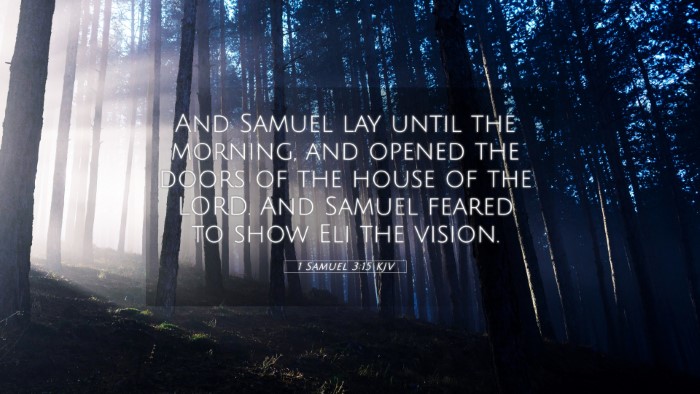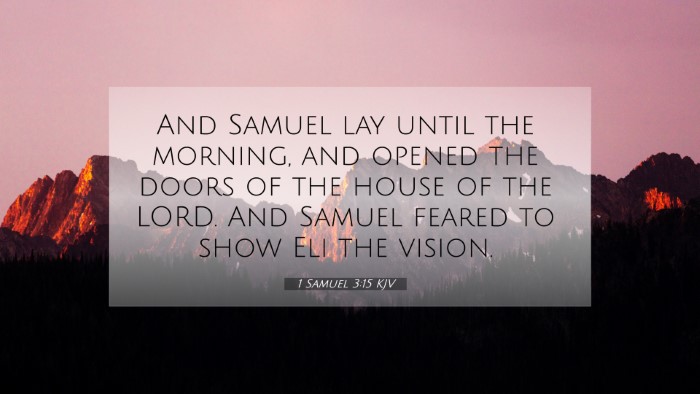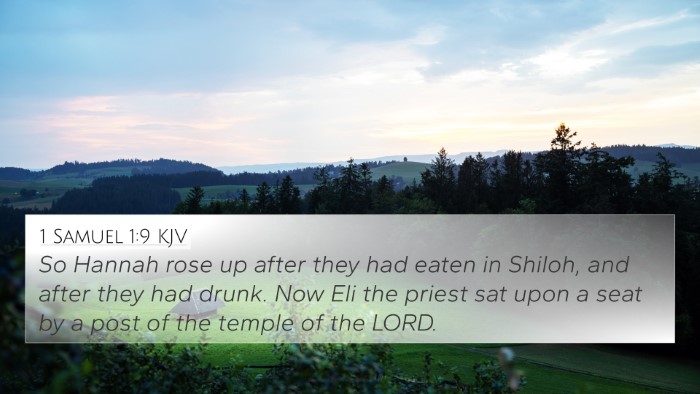Understanding 1 Samuel 3:15
Bible Verse: 1 Samuel 3:15 - "And Samuel lay until the morning, and opened the doors of the house of the LORD. And Samuel feared to show Eli the vision."
This verse marks a significant moment in the life of Samuel, highlighting both his accountability to God and the heavy responsibility he bore as a prophet.
Verse Meaning and Interpretation
According to public domain commentaries:
- Matthew Henry's Commentary: Henry notes that Samuel’s fear reflects the seriousness of the message he received. The message pertained to Eli’s house, which indicates a significant judgment from God. Samuel’s reluctance reveals the burden that comes with prophetic duties. Henry emphasizes the importance of being true to God’s message, regardless of personal apprehension.
- Albert Barnes' Notes: Barnes highlights the role of Samuel as a young prophet in Israel. He illustrates how this event signifies the transition from the corrupt priesthood of Eli to a new prophetic leadership. The fear Samuel experienced is a natural response to conveying difficult truths, and Barnes encourages recognizing the weight of such divine communications.
- Adam Clarke's Commentary: Clarke elaborates on the context, indicating that Samuel’s vision about Eli's demise signifies the end of an era in Israel's spiritual leadership. He discusses the implications for both Samuel and Eli, emphasizing that Samuel’s honesty is essential in delivering God’s truth, even when it is uncomfortable.
Key Themes and Cross-References
This verse is rich in themes of prophetic duty, accountability, and the fear of God. It connects with various other scriptures, illustrating a broader context within the Biblical narrative. Below are some connections:
- Jeremiah 1:7-8: A parallel can be drawn as God reassures Jeremiah about his calling, emphasizing that he should not fear the faces of men.
- 1 Kings 13:1-2: This relates to prophetic duties, where a man of God delivers a difficult message from God to King Jeroboam.
- Ezekiel 3:17: God's command for Ezekiel to speak God's words, bearing the responsibility for proclaiming truth.
- 1 Samuel 2:30-33: These verses foreshadow the judgment that Eli would face, setting the stage for Samuel's vision.
- Luke 12:4-5: Jesus speaks about the fear of God versus the fear of man, resonating with Samuel's fear of revealing the judgment.
- Acts 20:27: Paul emphasizes the importance of not shunning to declare all the counsel of God, similar to Samuel's task.
- Proverbs 1:7: The fear of the Lord is the beginning of knowledge, aligning with Samuel's holy reverence in delivering God's message.
- Matthew 10:28: This verse underscores the importance of fearing God over man, paralleled by Samuel's hesitation to inform Eli.
- Hebrews 13:17: This discusses accountability in spiritual leadership, akin to Samuel's relationship with Eli.
- 2 Timothy 4:2: Paul instructs Timothy to preach the word, reminding us of the duty to convey God’s message truthfully, echoing Samuel's commitment.
Application and Reflection
Understanding 1 Samuel 3:15 prompts us to reflect on our own responses to God's calling and the messages we may be called to share. It highlights the necessity of integrity and courage in facing hard truths, whether personally or in leadership roles. We are reminded of the weight of responsibility in sharing God's word faithfully.
Tools for Further Study
For deeper exploration, consider using the following tools:
- Bible Concordance: Helps in locating verses related to specific themes.
- Bible Cross-Reference Guide: Useful for identifying connections and themes across different scriptures.
- Bible Reference Resources: Provides comprehensive material on various Bible studies.
- Bible Chain References: A method to trace thematic links throughout the Bible.
Conclusion
1 Samuel 3:15 serves as a vital verse illustrating the challenges of prophetic ministry, the divine call, and the complexities of communication within a spiritual leadership context. It encourages us to explore the interconnectedness of scriptures and underscores the importance of maintaining fidelity to God's messages.






